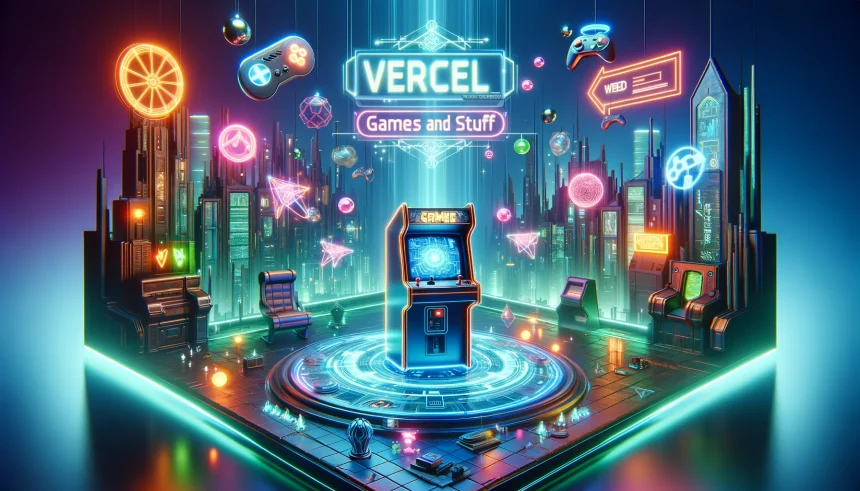Vercel is a cloud-based platform designed primarily for frontend developers. It provides an easy way to deploy and manage web applications, making it a great choice for hosting web-based games. Since it specializes in JavaScript frameworks like Next.js and React, game developers can build and deploy their projects quickly.
One of the main advantages of using Vercel is its serverless architecture, which eliminates the need for a dedicated backend. This allows developers to focus on game mechanics rather than worrying about server management. Vercel’s infrastructure is optimized for speed, ensuring smooth performance for lightweight browser games.
Unlike traditional game hosting services, Vercel is best suited for small to medium-sized web games. Developers can deploy interactive projects without setting up complex hosting environments. Whether it’s a simple arcade game or an AI-powered experiment, Vercel provides a seamless way to bring ideas to life.
Vercel automatically scales with traffic, which is ideal for games that gain sudden popularity. Even if a game goes viral, there’s no need to manually adjust server capacity. The global CDN further enhances the performance by delivering game content from the nearest location to the user.
With its free tier and simple deployment process, Vercel has become a popular choice among indie developers and hobbyists. Many use it to experiment with vercel games and stuff, exploring new ways to create interactive web experiences.
Types of Games That Can Be Hosted on Vercel
Vercel supports a variety of web-based games, but it is especially suited for browser-based projects. Developers can build simple arcade-style games using HTML5, JavaScript, and WebGL. These games run directly in the browser without requiring heavy backend support.
For those using modern frameworks, Next.js and React-based games can be deployed effortlessly. These frameworks allow developers to create interactive experiences with reusable components. Vercel’s automatic optimizations make React-based games load faster.
Games that rely on real-time interactions, such as multiplayer experiences, can also be hosted on Vercel. Technologies like WebSockets and serverless functions enable real-time gameplay, though performance may vary depending on complexity.
Some developers use Vercel to experiment with AI-driven games. These games incorporate APIs and machine learning models to create dynamic interactions. Since Vercel supports seamless API integration, it’s a good platform for such innovative projects.
While Vercel is not ideal for large-scale 3D or high-performance multiplayer games, it works well for small prototypes and casual games. Many developers use it for quick testing and showcasing ideas before moving to a dedicated game server.
Benefits of Using Vercel for Game Development
One of the biggest advantages of using Vercel is its fast global deployment. The platform uses a Content Delivery Network (CDN) to distribute game assets across multiple locations. This ensures that players experience minimal latency no matter where they are.
Vercel’s serverless functions allow developers to handle game logic efficiently. These functions can be used for player authentication, score tracking, or simple backend tasks. Since they run on-demand, they help reduce overall hosting costs.
Some key benefits of hosting games on Vercel include:
- Automatic scaling – Vercel adjusts resources based on traffic spikes, ensuring smooth performance.
- Free hosting for small projects – Developers can deploy and test games without paying for expensive servers.
- Seamless GitHub integration – Code changes are automatically deployed, making development faster.
- Built-in performance optimizations – Features like image optimization and caching improve game speed.
For indie developers and small teams, Vercel provides a hassle-free deployment experience. It allows them to focus on creativity rather than server management, making it a great choice for lightweight games.
Key Technologies Used in Vercel Games
Vercel supports a variety of technologies that make it easy to build and deploy browser-based games. Next.js is the most recommended framework, as it offers server-side rendering and static site generation for better performance.
For interactive and component-based UI, developers often use React.js. React helps in building dynamic user interfaces, making it easier to manage game elements like buttons, animations, and leaderboards.
Games that require 3D graphics can utilize Three.js, a JavaScript library for WebGL-based experiences. This allows for the creation of visually rich browser games without needing external game engines.
For real-time interactions, WebSockets are commonly used to enable multiplayer functionality. This technology allows players to communicate instantly, making it suitable for games with live competition or collaboration.
In some cases, developers use WebAssembly (WASM) to improve performance. WASM enables high-speed execution of game logic by running compiled languages like C++ or Rust within the browser. This helps in optimizing resource-intensive games hosted on Vercel.
Steps to Deploy a Game on Vercel
Deploying a game on Vercel is a simple process that requires minimal configuration. First, developers need to ensure that their game is structured properly. The project should be built using HTML, JavaScript, or a modern framework like Next.js.
Next, they must create a Vercel account and link their game’s code to a GitHub, GitLab, or Bitbucket repository. This allows for easy version control and automatic deployments whenever changes are made.
The deployment process involves these steps:
- Push the game code to a Git repository.
- Connect the repository to Vercel for automatic detection and setup.
- Deploy the game using the Vercel dashboard or the CLI (vercel deploy).
- Optimize performance by enabling caching and reducing asset size.
Once deployed, Vercel provides a live URL that can be shared with players instantly. Developers can also customize domain settings for branding and accessibility.
The final step is testing and optimizing the game for a better user experience. Adjusting performance settings, debugging errors, and monitoring traffic ensure the game runs smoothly.
Challenges and Limitations of Hosting Games on Vercel
While Vercel is excellent for lightweight web games, it has some limitations. One major drawback is the lack of full backend support. Since Vercel is serverless, complex backend logic must be handled with external databases or third-party services.
Storage constraints can also be an issue. Vercel is not designed to host large game files, so developers may need to use external storage solutions like AWS S3 or Firebase for media-heavy projects.
For multiplayer games, latency can be a challenge. While WebSockets help with real-time communication, Vercel is not optimized for fast-paced multiplayer experiences like FPS or MMORPG games. Dedicated game servers like Photon or Firebase Realtime Database may be better alternatives.
Despite these challenges, vercel games and stuff remain popular among developers for quick game prototypes. Many use it for testing concepts, creating interactive demos, or launching small-scale games for online audiences.
Overall, Vercel is best suited for small to medium web games that do not require high-performance servers. Developers looking for ease of use, fast deployment, and scalability will find it a great choice.
Conclusion
Vercel is a powerful platform for deploying and hosting web-based games, making it a great choice for indie developers and small teams. Its serverless architecture, global CDN, and automatic scaling ensure that games run smoothly without requiring complex backend management. This makes it ideal for browser-based, AI-driven, and lightweight multiplayer games.
However, Vercel does have some limitations, especially for large-scale multiplayer or high-performance 3D games. While it supports WebSockets and serverless functions, dedicated game servers may be needed for more complex real-time interactions. Developers handling large game assets may also require external storage solutions to avoid limitations.
Despite these challenges, vercel games and stuff continues to be a popular choice for web-based gaming projects. It provides an easy, cost-effective, and scalable solution for game deployment. Whether you’re testing a prototype or launching a fully functional web game, Vercel offers the tools to make development fast and hassle-free.
FAQs
Can I host multiplayer games on Vercel?
Yes, but for real-time multiplayer, you may need WebSockets and external game servers for better performance.
Is Vercel free for hosting small games?
Yes, Vercel offers a free tier suitable for small projects with limited resources and traffic.
Which game engines work best with Vercel?
Vercel supports JavaScript-based frameworks like Next.js, React, and Three.js for browser games.
Does Vercel support high-performance 3D games?
Vercel can host lightweight 3D games using WebGL, but heavy games may require dedicated game servers.
Can I use Vercel to deploy AI-powered games?
Yes, you can integrate APIs and machine learning models to create AI-driven browser games.













